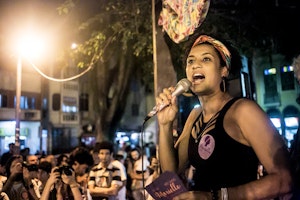Talking Justice: Corruption Busting in Guatemala
In Guatemala they call the scandal La Línea—a reference to the telephone wiretap that sparked the country’s biggest-ever corruption case and brought down a government. La Línea exposed a massive network of fraud involving customs revenues that allegedly included top government officials and business leaders. Coming on the heels of a string of earlier revelations, the scandal fueled unprecedented public protests last year. In September, it led to the resignation and arrest of President Otto Pérez Molina himself.
But how did the La Línea investigation come to fruition in a country where efforts to bring the powerful to justice have usually been thwarted by well-financed networks of patronage and intimidation?
The case, and the surfacing of last year’s other corruption scandals, were the dramatic result of a unique experiment in international justice known locally by its Spanish acronym, CICIG—the International Commission against Impunity in Guatemala.
CICIG was set up in 2007 after the government sought international help in confronting the threat of organized crime groups that had infiltrated the police, the courts, and the prisons. Tasked with supporting Guatemala’s criminal justice system, CICIG now has around 190 international and local staff working with the Ministerio Publico—Guatemala’s attorney general’s office—which it helped to set up the La Línea wiretaps. Previously, CICIG supported judicial reforms that established special courts for risky cases, one of which is now handling the high-profile La Línea trial of former Vice President Roxanne Baldetti.
In the latest episode of Talking Justice, Patrick Gavigan—author of a new Open Society report, Against the Odds: CICIG in Guatemala—speaks with James A. Goldston, executive director of the Justice Initiative, about CICIG’s uncertain road to success, and the outlook for Guatemala after the La Línea revelations.
Learn More
Transcript
JAMES A. GOLDSTON:
You’re listening to Talking Justice, I’m Jim Goldston, and in this edition, we’re looking at Guatemala, a country in Central America that suffered more than three decades of civil war between a U.S.-backed military and left win guerillas that cost more than 200,000 lives.
JAMES A. GOLDSTON:
The first protests started last spring, ordinary Guatemalans taking to the streets angry of a series of corruption scandals that seemed to reach into the very highest levels of government. As the revelations continued, the protests grew with thousands of people massing daily in the center of Guatemala City, calling on President Otto Perez Molina to resign.
MALE VOICE:
(FOREIGN LANGUAGE NOT TRANSCRIBED).
JAMES A. GOLDSTON:
In late August, the president went on national television to declare that he would not stand down. He had nothing to do, he said, with a massive network of corruption, known as La Linea, for the telephone line that conspirators used to carry out their scheme, whose tentacles reached far and wide in his administration. It was a stunning declaration of defiance, and it failed. Within weeks the president had been forced from office and sent to prison where he remains.
The dramatic fall of Perez Molina and his government was a political earthquake. It was also a remarkable victory for Guatemalan civil society, prosecutors, and a novel United Nations–backed body whose existence is little known outside the country. The International Commission Against Impunity in Guatemala, whose Spanish acronym is CICIG, played a crucial role in uncovering the facts and bolstering the investigations that brought down the president.
CICIG was established in 2007 as Guatemala turned to the UN in its efforts to fight the growing threat of organized crime. Backed by overseas donors, it has pursued path breaking criminal investigations, strengthened the public prosecutor’s office, challenged the election of unfit judges, proposed sweeping legislative reforms, and pioneered the use of sophisticated investigative techniques. But how did all this happen, and is there anything the rest of the world can learn from the story of CICIG?
JAMES A. GOLDSTON:
I’m joined now by Patrick Gavigan, the author of Against the Odds: CICIG in Guatemala, a comprehensive assessment of CICIG’s record, just published by the Open Society Justice Initiative. A veteran of transitional justice environments and UN missions around the world, Patrick has spent many weeks over the past few years in Guatemala conducting firsthand research. As a result, he has had a close-up view of CICIG’s sometimes bumpy journey.
JAMES A. GOLDSTON:
Patrick, can you give us a sense of the size and scale of CICIG?
PATRICK GAVIGAN:
Sure, CICIG, which its Spanish acronyms mean the International Commission against Impunity in Guatemala, is an international organization of about 150 Guatemalan staff based in Guatemala. And it’s a combination of lawyers, that is attorney generals investigators, police specialists, forensic specialists, and researchers with a significant security component.
JAMES A. GOLDSTON:
And how did CICIG ever get started up in a country which had experienced so much civil war and violence?
PATRICK GAVIGAN:
CICIG grew out, really, of a of a request from human rights organizations back in 2001, 2002, seven years after the end of the civil war. Human rights organizations, which were investigating war crimes committed during the civil war, particularly war crimes committed by the Guatemalan armed forces, and they were facing threats, attacks, and some killings from what they believed were elements of the Guatemalan armed forces.
So they requested the UN and the Organization of American States for assistance. The proposal obviously also generated enormous political opposition in Guatemala from the Guatemalan conservative parties, from the Guatemalan right, from the military, all of whom saw this as a proposal or a project to support the left in its investigations of responsibility for war crimes committed during the war.
JAMES A. GOLDSTON:
After so much opposition, what ultimately pushed the CICIG proposal through the Guatemalan government?
PATRICK GAVIGAN:
After so much opposition, it was the scandal created by the killing of three central American parliamentary deputies who were travelling from El Salvador to Guatemala. They were killed by a group of Guatemalan national police officers. These national police officers were quickly identified and were jailed, and then shortly thereafter, they were executed within their own prison. And this scandal came in the middle of a Guatemalan presidential election and forced the main Guatemalan presidential candidates to have to take a position on CICIG.
And the way the position was offered to them from both national and international actors was if you are in favor of organized crime, impunity as revealed in these parlisan killings, then you are not in favor in CICIG. If you are against organized crime, if you want Guatemala to take an important step forward against these kinds of killings, then you have to vote in favor of CICIG.
JAMES A. GOLDSTON:
So it was pretty hard to vote against the proposal at that point, it seems?
PATRICK GAVIGAN:
In principle, you would think so, but it was a very, very close vote and required an enormous scandal like these killings, and enormous pressure on presidential candidates. Had you not had a presidential campaign, had these candidates, had these parlisan deputies, not been killed in this way, CICIG itself probably would not have been ratified.
JAMES A. GOLDSTON:
Did anybody at that time anticipate that by approving CICIG, they might be approving the indictment of a president or vice president?
PATRICK GAVIGAN:
No, I don’t think so at all, Jim. The question asked, I think, at the time was—and is asked even today—how would we define success for something like CICIG? Would it be its ability to investigate and bring to prosecution, and co-prosecute with the attorney general, two or three important cases, go after two or three formally untouchable political actors and demonstrate that, in fact, impunity was not a fact of life in Guatemala, that it could be addressed with the robust judiciary, and the political willingness of Guatemala’s political actors to allow this to go forward?
JAMES A. GOLDSTON:
And in fact, in its early years, CICIG did in fact demonstrate that prosecutions of important powerful individuals was possible, is that right?
PATRICK GAVIGAN:
No, indeed, it carried out a number of spectacular investigations. The most spectacular, and the most bizarre, of course, was a an investigation of a case outside its mandate, and that was the case that made CICIG’s name. And that was the Rosenberg case in which a well known, highly respected, Guatemalan lawyer was killed one day when he was out bicycling in Guatemala City—assassinated—and his family and his friends and political allies in Guatemala blamed the Guatemalan president. And the case took a very, very strange twist when the day of Mr. Rosenberg’s funeral, a video that he himself had taped began circulating in which he himself blamed the Guatemalan president and his entourage for his killing.
JAMES A. GOLDSTON:
This is the victim of the assassination? There was a video of him?
PATRICK GAVIGAN:
The victim of the assassination had produced a video saying, effectively, if you’re watching this video, it means I’ve been killed and I have been assassinated by the president and his entourage for the following reasons.
JAMES A. GOLDSTON:
And when all eyes were looking to the government for responsibility, what was CICIG’s role then? What did they do?
PATRICK GAVIGAN:
Well, obviously, the video created not only a national, but an international firestorm. The president, you have to understand, this is all occurring within the context of Guatemala’s post conflict politics. The president is center left, the center right and very conservative right wing opponents saw this as an opportunity to try and bring down his government. So there was an enormous set of protests, condemnations of the president, and calls for him to resign. This created an enormous political crisis in Guatemala which was temporarily resolved when the president asked CICIG to investigate and resolve the claims that he had been responsible for this murder.
JAMES A. GOLDSTON:
And what did CICIG find, very briefly?
PATRICK GAVIGAN:
CICIG investigated for four or five months and found that, in fact, Mr. Rosenberg was the author of his own assassination. He had arranged for his own killing for a number of complicated reasons, but hoped by doing so he would bring down also the government of the president whom he held responsible for a number of things relating to his personal life and his businesses.
JAMES A. GOLDSTON:
Now, CICIG has had a very important impact in Guatemala, but Guatemala is not alone in the world in looking for innovative solutions to address impunity for serious crime. Just next door in in Honduras, an analogous mechanism has been recently created to deal with corruption. Ukraine is a country which is awash in corruption, is looking for answers. There are other places as well. Does CICIG offer a model that can be of use to others?
PATRICK GAVIGAN:
It took seven years of ups and downs in Guatemala for CICIG to be able to arrive at a moment, historical moment, in Guatemala, when its own capacities, and a Guatemalan public fed up with corruption, were able to produce these spectacular investigations that led to the fall of a president, and opened a window for serious political change in Guatemala. That said, I think one can take very important lessons from CICIG for other places. One, it’s important for CICIG, or a CICIG like entity, to have the capacity to operate independently, carry out independent investigations, and have some independent prosecutorial capacity.
When CICIG entered Guatemala in 2007, its allies were a number of human rights organizations, the international community, and the United Nations. It had very, very little political support. The final element of support for CICIG in in Guatemala was the United States, primarily, and a number of several European governments that provided financial and political support. And without political support of the United States at crucial moments, including during CICIG’s two-year renewal process CICIG itself may have closed before it had an opportunity to launch these investigations in 2015.
JAMES A. GOLDSTON:
Now, of course,we have a new president in Guatemala today. Jimmy Morales, who was elected last year, who as I understand it, has already said that he will request that the mandate of CICIG be extended all the way to 2019. Does that mean it’s free sailing and CICIG has a ready road in Guatemala and that ultimately it’s no longer needed because the rule of law has been consolidated?
PATRICK GAVIGAN:
I think that’s far from the case. I think as all Guatemalan observers would concede, including the president, who has recognized the important role that CICIG has played in his own election. CICIG now has the advantage of working with a much stronger attorney general, an attorney general’s office committed to reform.
They have the enormous advantage of a Guatemalan public that took to the streets in an unprecedented historical manner last year, which is now viewed itself civil society—hundreds of thousands of citizens—returning to the streets this year to ensure that the reform processes that began last year continue. But this is a long-term process, Jim, and those whose interests are threatened by CICIG actions last year, those whose interests are threatened by a more robust and strong judiciary, are not sitting still.
JAMES A. GOLDSTON:
I’ve been talking to Patrick Gavigan, author of Against the Odds, CICIG in Guatemala, a new report from the Open Society Justice Initiative, now available on our website.
JAMES A. GOLDSTON:
Meanwhile, Guatemala has a new president.
MALE VOICE #2:
(FOREIGN LANGUAGE NOT TRANSCRIBED)
JAMES A. GOLDSTON:
In December’s presidential poll, Guatemalans ended up shunning the established political groups and chose instead Jimmy Morales, a former TV comedian whose colorful campaign included the slogan, “Guatemala is not for sale.”
President Morales has pledged to support CICIG’s mandate until 2019, but what we’ve heard today suggests that building the rule of law in Guatemala ultimately depends not only on CICIG, but also on the country’s political leaders, and their readiness to take the sometimes difficult decision to support truly independent justice.
Thanks for listening. I’m Jim Goldston, executive director of the Open Society Justice Initiative. I’ll be next month with another addition of Talking Justice.


